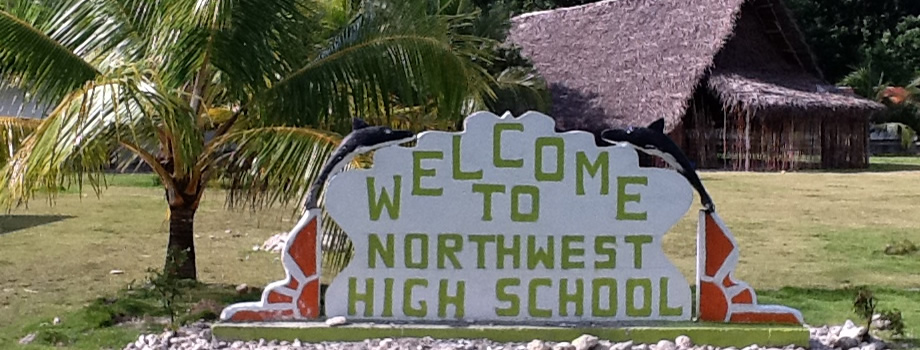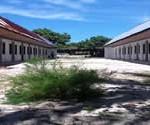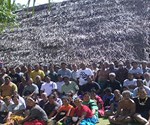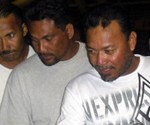On July 3, 2012, the participants in the Northwest Educational Leadership Summer Institute comprising of teachers, principals, mayors, municipal council presidents, church leaders, and traditional chiefs from throughout all three regions of Weito, Pattiw, and Pafeng agreed to accept the Chuuk State Department of Education’s plan to turn Weipat Junior High School into a 4-year high school serving all three regions in the Northwest. The delegation also unanimously voted to change the name Weipat (which only recognizes Weito and Pattiw) to Northwest High School.
This is the third name change for this school since its founding back in the 1960’s. During the summit, the participants invoked the spirit of the traditional chiefs who founded the school in the 60’s as an Intermediate School. They recalled how the name was changed to Weipat Junior High School to stay with the mission as a junior high school for Pattiw and Weito students. Now that it is becoming the only high school serving all three regions, the leaders felt they needed to honor the students from Pafeng at the school by changing the name to one that is inclusive of all three regions.
The Early Years
The concept of a school for the outer islands began when Chuuk was still part of the Trust Territory of the Pacific Islands. In those early years in the fifties and sixties elementary education was from the first to six grades and Intermediate level was from seventh up to ninth grade. There was only one intermediate school in Chuuk called Truk Intermediate School located on the main island of Weno. If they qualify, graduates from the Truk Intermediate School would go on to attend the Pacific Islands Teachers Training School (PITTS) which trained the top students from the other intermediate schools within the Trust Territory. Graduates from PITTS could either find employment in the government’s central offices in their district or go on to continue their education in college. Xavier High School was the only other college preparatory school at the time, but was highly selective.
To enter into the Truk Intermediate School, students had to pass an entrance test that was administered at the end of the sixth grade. It was not unusual for students who did not pass the entrance exam to drop out of school altogether. It soon became obvious that outer island students from the Northwest regions were at a disadvantaged because of the lack of educational resources; very few sixth graders from the Northwest region passed the entrance examination. Consequently, the drop out rates among outer island students was alarmingly high in those days as there were no other alternative to further their education beyond the already limited opportunities.
In 1964 Mr. Ermes Smith, the area supervisor of Weito and Pattiw, shared this problem with the director of education, an American named Mr. Frank and his Chuukese assistant Mr. Chutomu Nimwes. Together they began to discuss the prospects of a post-elementary education in the outer islands to prepare students for the entrance exam. This was a radically new solution to the problem which had never been attempted before in Chuuk, nor in any part of the Trust Territory. This idea of a post-elementary education excited Mr. Smith so much that he could not rest unless he put the idea into action. Fortunately that summer of 1964, a leadership conference was held on Weno which brought all the chief-magistrates and traditional chiefs together. Mr. Smith presented to the leaders on the idea to start a post-elementary school for Weito and Patiw on Onoun Island. The leaders liked the idea so much that they set a date later that summer to hold a meeting on Onoun for further discussions.
The Vision
Later that summer traditional sailing canoes were launched from all the islands of Weito and Patiw bringing the traditional chiefs and other elders (repien fanu) to Onoun for their own leadership summit. This was the largest gathering of traditional leaders from the outer island regions of Weito and Pattiw. Their main focus and agenda was to discuss how best to serve the needs of the children of those islands.
At this meeting they unanimously agreed to start a post-elementary school on Onoun for the students from these two regions. Onoun was the ideal host for the campus because of its central location to these outer islands. The traditional chiefs then requested the Truk Education Department for the approval to start the school.
The admission policy for the school was also decided in that meeting. The leaders agreed to let each island community to select whom to enroll and they were to bring them by traditional outrigger canoes which was the only reliable means of transportation. The people of Onoun agreed to host the school, provide local house for classroom space, uuts for sleeping quarters for the male students, and to serve as “sponsors” or host families for the female students. The leaders also drafted a set of school rules and policies and agreed to open the school with a class of twenty five with one teacher. The boys were to sleep at a canoe house, and the elders of Onoun were made responsible to watch over them, and girls were to reside with sponsor families.
At this meeting they formed a delegation headed by Mr. Smith to get approval of the school from the Truk Department of Education and the district administration office. Other members were Chief Magistrate Leon Episom and Traditional Chief Raymond Opich both were from Onoun. Other leaders who could be on Weno were also invited to join the delegation.
Ulul Post Elementary School
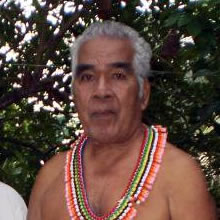
Mr. Basilio Saipweirik, the first teacher at what is now Northwest High School. He went on to become the principal for Houk Elementary School until his retirement in the 90’s.
The request to the Department of Education was successful. Permission was granted to open the school on a trial basis. The Department agreed to hire a teacher for school, and also help with chalk, paper and pencils. Results of the Truk Intermediate School test would determine the future of the school. The school was called Ulul Post Elementary at that time Ulul Post Elementary was first opened Fall of 1965. As agreed each island selected their best and brought them to Onoun by canoe. Mr. Basilio Saipwerik, a graduate of Xavier High School from the island of Houk (Pulusuk) was hired as the first teacher. School opened that first year as planned.
Community support from throughout the region was extremely high. Canoes from all the islands visited so often bringing food and other necessities. Parents were involved by giving advise and encouragements to the students. The chiefs and (repian fanu) elders provided the words of wisdom to the students.
The moment of truth came at the conclusion of that first year with the annual entrance test for Truk Intermediate School. Eighteen out of the twenty students successfully passed the entrance examination. This was especially successfully considering that all eighteen students had not passed the examination at their elementary schools and would have joined the dropout statistics.
Ulul Post Elementary became a model school in Chuuk overnight. The Department readily granted a permanent charter for the school. News about the success travelled fast from Truk District and throughout the Trust Territory. The following year in 1966 other post-elementary schools were opened replicating the Ulul Post-Elementary school model.The school continued to receive very strong community support and successfully admitted more of its students to the Truk Intermediate School.
Weipat Junior High School
The success of the Ulul Post-Elementary School brought much pride and joy to the people in the outer islands of Weito and Pattiw. It gave them a very strong sense of ownership especially Mr. Ermes Smith and the traditional chiefs whose visions in the summer of 1964 bore the school.
But the needs of those outer islands and the State continued to evolve precipitating the school to also change and evolve to meet those needs. As the Truk Intermediate School changed into Truk High School, Ulul Post-Elementary School evolved and changed into Weipat Junior High School in 1968 as elementary education throughout the entire Truk District (now Chuuk State) evolved to include 1st to 8th grades.. This same year the school enrollment admitted students from Pafeng in addition to the usual students from Weito and Pattiw. Two years later in 1971 Weipat Junior High School, which had previously admitted 7th to 10th graders, became exclusively for they transitioned to 11th and 12th grades at Truk High School.
Northwest High School
The year 2004 brought yet another evolution in Weipat’s history. As a result of sweeping changes across the State, the Chuuk State School System (formerly Department of Education) made the decision to turn Weipat Junior High School into a 4-year high school to exclusively serve the Northwest region. The State’s decision, while it has the advantage of keeping the Northwest students closer to their home islands, has brought an entirely new set of service-oriented and educational challenges. In July, 2012 the leaders
While the decision to turn Weipat Junior High School into a 4-year high school has made secondary education accessible to the outer islands, it comes with an entirely new sets of service-oriented and educational challenges. We dare to state these obvious challenges to seek help from the State and the Nation. But more importantly, we present them below to challenge ourselves as the Northwest community to work together to find solutions for them. The needs and challenges are great, but together with our local, state, municipal, parental, and global partners, we can meet them with resolve and perseverance. We must meet them for the sake of our children and the future generations of Northwest leaders.
Statement of Needs
Accessibility: The campus is located on the remote outer island of Onoun, located hundreds of miles over open water. While there is a small airfield on the island, the small government-subsidized airline only flies with a full flight. The state-run fieldtrip cargo ships have been sporadic in their services to the outer islands.
Operational Budget: The operational budget for the school has not adequately reflected the growth of the enrollment.
Shortage of Qualified Teachers: Chuuk State recently laid off close to half of its teachers. All the Northwest Unified Schools including were affected by this need to trim the teachers to those who are credentialed. Efforts must be made to send Northwest teachers to the College of Micronesia to get complete degrees.
Communal Apathy: While the school has enjoyed the support of the people of Onoun, the same cannot be said for other islands in the Northwest. The traditional chiefs who were part of the support system for the school have long since died and their successors have not afforded the same moral support to the school.
Alumni: There has never been any formal attempt to engage the alumni of Northwest High School to help support the needs of the school. That is a large base of support that has never been formally organized and mobilized.
Food Security: Recent environmental impacts have negatively affected food security in the outer islands. Resources are already scarce in those remote islands, but wthout a reliable and economical transportation system, much needed resources cannot reach the campus in a timely fashion. On Onoun where global warming has affected the taro plantations and other stable food source, it is becoming more challenging for the local sponsor families to provide food for their children and their Northwest students.
Digital Divide: In today’s modern world, students need access to the limitless educational resources on the internet. Greater efforts must be made to provide operational internet access computers using available satellite technology. This must be done to help prepare the high graduates for college.
Professional Development: The distance of the school from the main commercial and governmental center on Weno makes it a real challenge for teachers and administrators to access the professional development opportunities that occur at the College of Micronesia and other state-sponsored conferences, trainings, leadership summits.
Interscholastic Disengagement: Outer island students simply do not have access to the educational, athletic, leadership development opportunities that are readily available to their peers from the private and public schools located within the Chuuk lagoon. Weipat has no system of advocacy on the main island of Weno to bring NHS’s needs to the forefront of program planning and implementation among the schools.
Health Care: The distance of the campus from the center and the lack of the fieldtrip ships has made it nearly impossible for students to access health services from the state-run hospital, dental clinics, public health clinic, and other privately-operated pharmacies.
Library Resources: What is formal education at a high school level without adequate library resources? Northwest High School has no functional library for its students.
Facilities Improvement: The facilities before Weipat was forcibly made into a 4-year high school had been in a dire state of disrepair. There is no plan for any new classroom buildings to accommodate the increasing enrollment.
In 1989, the Weipat community declared November 9th as Founders Day to commemorate and celebrate the visions and accomplishments of all those who contributed to the founding of Weipat. The Founders included Mr. Ermes Smith, the traditional chiefs and elders (repien fanu), Mr. Basilio Saipweirik the first teacher and all subsequent teachers, the staff who are still taking active roles in the school at the present. May Weipat receive back the love and respect it once had from our people. May it once again receive the glory of the olden days.
